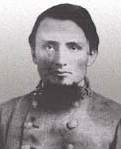 Open main menu
Open main menu
 Open main menu
Open main menu

V. H. Manning
"Van"
(1839 - 1892)
Home State: Arkansas
Education: University of Nashville, TN
Command Billet: Commanding Brigade
Branch of Service: Infantry
Before Sharpsburg
Born in NC, he moved with his parents to Mississippi in 1841; attended Horn Lake Male Academy, De Soto County, Miss., and the University of Nashville, Tennessee; moved to Arkansas in 1860; Delegate to Democratic National Convention from Arkansas, 1860.
He studied law; was admitted to the bar in 1861 and commenced practice in Hamburg, Ark.
At the outset of the War he helped organize and served as a Major and subsequently as Colonel (March 1862) of the Third Arkansas Infantry.
On the Campaign
In command of Walker's Brigade, Walker's Division in Longstreet's Wing. He was severely wounded while leading the Brigade in action near the West Woods on the morning of the 17th, and was replaced in command by Colonel Edward B Hall, 46th North Carolina Infantry.
General Walker characterized Manning's actions as follows (in his official report):
"Colonel Manning, with the Forty-sixth and Forty-eighth North Carolina and Thirtieth Virginia, not content with the possession of the woods, dashed forward in gallant style, crossed the open fields beyond, driving the enemy before him like sheep, until, arriving at a long line of strong post and rail fences, behind which heavy masses of the enemy's infantry were lying, their advance was checked; and it being impossible to climb over these fences under such fire, these regiments, after suffering a heavy loss, were compelled to fall back to the woods ..."
" Just before the falling back of these regiments, the gallant Colonel Manning was severely wounded and was compelled to leave the field, relinquishing the command of the brigade to the next in rank, Col. E. D. Hall, of the Forty-sixth North Carolina Regiment."
"... The division suffered heavily, particularly Manning's command (Walker's brigade), which at one time sustained almost the whole fire of the enemy's right wing. Going into the engagement, as it was necessary for us to do, to support the sorely pressed divisions of Hood and Early, it was, of course, impossible to make dispositions based upon a careful reconnaissance of the localities. The post-and-rail fences stretching across the fields lying between us and the enemy's position, I regard as the fatal obstacle to our complete success on the left, and success there would, doubtless, have changed the fate of the day. Of the existence of this obstacle none of my division had any previous knowledge, and we learned it at the expense of many valuable lives."
The rest of the War
Col Manning returned to his Regiment, the 3rd Arkansas now assigned to Hood's Texas Brigade, and led it throught the campaigns of the ANV until The Wilderness in May 1864. There Col Manning was shot through the thigh and captured, remaining a prisoner til July 1865.
After the War
U.S. Representative from Mississippi 2nd District, 1877-83
References & notes
Source: US Congressional Biography.
More on the Web
See a nice site about the 3rd Arkansas Infantry, and another bio at the Texas Brigade site.
Birth
7/26/1839; near Raleigh, NC
Death
11/2/1892; Branchville, Prince George's County, MD; burial in Glenwood Cemetery, Washington, D.C.